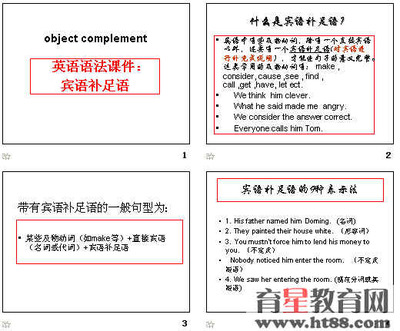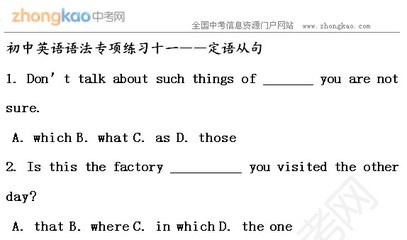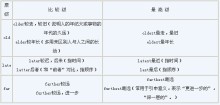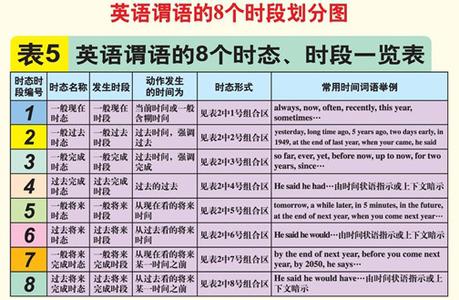中考是九年义务教育的终端显示与成果展示,其竞争较为激烈。为了更有效地帮助学生梳理学过的知识,提高复习质量和效率,在中考中取得理想的成绩,下文为大家准备了中考英语难点语法详解的内容。
【名师点睛】
1. 形容词的用法
(1) 形容词在句中作定语, 表语, 宾语补足语。 例如:
Our country is a beautiful country. (作定语)
The fish went bad. (作表语)
We keep our classroom clean and tidy. (作宾语补足语)
(2) 形容词修饰something, anything, nothing, everything等不定代词时,形容词放在名词后面。
I have something important to tell you.
Is there anything interesting in the film.
(3) 用 and 或 or 连接起来的两个形容词作定语时一般把它们放在被修饰的名词后面。起进一步解释的作用。
Everybody, man and woman, old and young, should attend the meeting.
You can take any box away, big or small.
(4) the+形容词表示一类人或物
The rich should help the poor.
2. 副词的用法
(1) 副词在句中可作状语,表语和定语。
He studies very hard. (作状语)
Life here is full of joy. (作定语)
When will you be back? (作表语)
副词按其用途和含义可分为下面五类:
1)时间副词
时间副词通常用来表示动作的时间。常见的时间副词有:now today, tomorrow, yesterday, before, late, early, never, seldom, sometimes, often, usually, always等。例如:
He often comes to school late.
What are we going to do tomorrow?
He is never been to Beijing.
2)地点副词
地点副词通常用来表示动作发生的地点。常见的地点副词有:here, there, inside, outside, home, upstairs, downstairs, anywhere, everywhere, nowhere, somewhere, down, up, off, on, in, out等。例如:
I met an old friend of mine on my way home.
He went upstairs.
Put down your name here.
3)方式副词
方式副词一般都是回答“怎样的?”这类问题的,其中绝大部分都是由一个形容词加词尾-ly构成的, 有少数方式副词不带词尾-ly, 它们与形容词同形。常见的方式副词有:anxiously, badly, bravely, calmly, carefully, proudly, rapidly, suddenly, successfully, angrily, happily, slowly, warmly, well, fast, slow, quick, hard, alone, high, straight, wide等。例如:
The old man walked home slowly.
Please listen to the teacher carefully.
The birds are flying high.
He runs very fast.
4)程度副词
程度副词多数用来修饰形容词和副词,有少数用来修饰动词或介词短语。常见的程度副词有:much, (a) little, a bit, very, so, too, enough, quite, rather, pretty, greatly, completely, nearly, almost, deeply, hardly, partly等。例如:
Her pronunciation is very good.
She sings quite well.
I can hardly agree with you.
5)疑问副词是用来引导特殊疑问句的副词。常见的疑问副词有:how, when, where, why等。例如:
How are you getting along with your studies?
Where were you yesterday?
Why did you do that?
(2)副词在句中的位置
1)多数副词作状语时放在动词之后。如果动词带有宾语,则放在宾语之后。例如:
Mr Smith works very hard.
She speaks English well.
2)频度副词作状语时,通常放在行为动词之前,情态动词,助动词和be动词之后。例如:
He usually gets up early.
I’ve never heard him singing.
She is seldom ill.
3)程度副词一般放在所修饰的形容词和副词的前面, 但enough作副词用时,通常放在被修饰词的后面。例如:
It is a rather difficult job.
He runs very fast.
He didn’t work hard enough.
4)副词作定语时,一般放在被修饰的名词之后。例如:
On my way home, I met my uncle.
The students there have a lot time to do their own research work.
(3)部分常用副词的用法
1) very, much
这两个副词都可表示“很”,但用法不同。Very用来修饰形容词和副词的原级,而much用来修饰形容词和副词的比较级。例如:
She is a very nice girl
I’m feeling much better now.
Much可以修饰动词,而very则不能。例如:www.zhongkao5.com//
I don’t like the idea much.
They did not talk much.
2) too, either
这两个副词都表示“也”,但too用于肯定句,either用于否定句。例如:
She can dance, and I can dance, too.
I haven’t read the book and my brother hasn’t either.
3) already, yet
already一般用于语肯定句,yet一般用于否定句。例如:
He has already left.
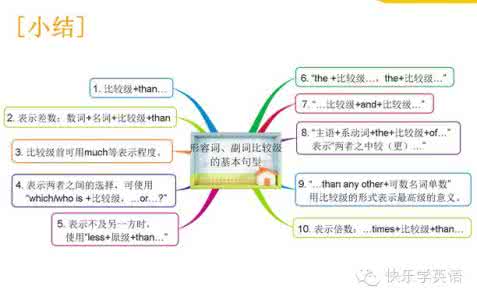
Have you heard from him yet?
He hasn’t answered yet.
4) so, neither
so和neither都可用于倒装句, 但so表示肯定,neither表示否定。
例如:
My brother likes football and so do I.
My brother doesn’t like dancing and neither do I.
3. 形容词和副词的比较级和最高级
(1) 两个人或事物的比较时(不一定每一方只有一个人或一个事物),用比较
级。
Our teacher is taller than we are.
The boys in her class are taller than the boys in your class.
(2) most 同形容词连用而不用 the,表示 "极,很,非常, 十分"。
It’s most dangerous to be here.
在这儿太危险。
(3) "The+形容词比较级..., the+形容词比较级..."表示 " 越... 就越..."。
The more you study, the more you know.
(4) " 形容词比较级 + and + 形容词比较级 ", 表示 " 越来越... "。
It’s getting hotter and hotter.
(5) 主语+谓语(系动词)+as+形容词原形+as+从句。表示两者对比相同。
This box is as big as mine.
(6) the + 形容词 表示某种人。
He always helps the poor.
(7) 形容词和副词最高级用于三个或三个以上的人和物进行比较。
Shanghai is one of the biggest cities in China.
这篇中考英语难点语法详解的内容,希望会对各位同学带来很大的帮助。
爱华网网官方公众平台--【精品初中生】正式上线啦,大家可扫描下方的二维码关注,也可搜索微信号“zk”或者直接输入“精品初中生”进行关注!!我们每天会为大家推送最新的内容哦~
百度搜索“爱华网”,专业资料、生活学习,尽在爱华网!
 爱华网
爱华网